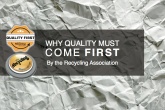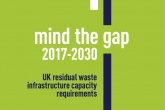Five things we learned at RWM 2017
Three days of expert discussion and presentations covered a lot of waste and resources ground at the RWM Conference in Birmingham this week. Here’s a snapshot of some of the things that we picked up wandering the show floor.
Scotland’s bottle deposit return scheme policy needs work
Following Scottish First Minister Nicola Sturgeon’s recent commitment to introduce a bottle deposit return scheme (DRS) as part of her government’s drive to implement a circular economy north of the border, a panel discussion at RWM 2017 revealed the industry’s scepticism regarding whether such a scheme would actually have the desired effect of extending producer responsibility.
In a panel featuring Helen MacFarlane, Environment Consultant at Mcdonald’s; Nick Brown, Head of Sustainability at Coca-Cola European Partners; Paul Vanston, CEO of the Industry Council for Research on Packaging and the Environment (INCPEN); and Frances Page Pimenta, Policy Advisor on Producer Responsibility at Defra, it was clear that those within the industry felt there were many issues with a DRS that still needed to be addressed before it could be implemented in Scotland.

INCPEN has opposed the introduction of a DRS in the UK for some time, and new CEO Vanston was especially forthright with his views that, in its current guise, the proposed scheme amounted to “cost shunting” and questioned the value of such a scheme if the aim is to improve recycling rates and reduce littering.
Wales, he said, currently achieves the second highest recycling rates in the world without a DRS, and claims that the capital costs of setting up such a scheme, essentially starting from a blank canvas in terms of infrastructure, would run into the hundreds of millions of pounds. Vanston called for improvements in kerbside recycling collection before committing to a DRS, while Pimenta stated that the government was keen to improve on-the-go recycling options and was looking seriously at improving the country’s ‘binfrastructure’ in order to tackle littering at source.
Data to create more efficient services is out there, but we need to get better at collecting it
Wednesday morning at the Municipal & Materials Recovery Theatre saw a number of talks about how smart technology and data could be used to create better pathways and services for handling resources and reducing their waste.
The consensus among delegates using the public voting application was that while data is about, it is not reported or collected well enough to be fulfilling its potential use.
 Cindy Lee from Zero Waste Scotland acknowledged that useful data is currently sitting in different places and not talking to each other, and that ZWS is looking at developing one way to track waste transactions as close to real time as possible so that data is consistently available. Andrew Woodend, Defra’s waste management statistician added that the overlap on data needs for the government and industry is massive, and so increased engagement between the two is needed.
Cindy Lee from Zero Waste Scotland acknowledged that useful data is currently sitting in different places and not talking to each other, and that ZWS is looking at developing one way to track waste transactions as close to real time as possible so that data is consistently available. Andrew Woodend, Defra’s waste management statistician added that the overlap on data needs for the government and industry is massive, and so increased engagement between the two is needed.
One big chunk of data that is missing, however, is that of commercial and industrial waste, and as Peter Scholes from consultancy Anthesis pointed out, the lack of robust waste data, particularly in that sector, is the biggest problem at present. Municipal waste only makes up around 13 per cent of the UK’s total generation, and so a clearer idea of this is needed to answer ongoing questions about treatment capacity and the waste industry's role in the UK’s industrial strategy.
Elsewhere on the use of smart data, Teresa Gonzalez from the Future Cities Catapult gave an update on work that the network is doing in London to see how interventions utilising the Internet of Things and other smart technology could be used to improve efficiency in urban areas. Working with Resource London, UCL, Ferrovial and the London Borough of Ealing, the Londoners’ Lab is currently generating an evidence base and hopes to have interventions running on a trial basis before the end of the year.
Quality is moving up agenda
The launch of the Recycling Association’s first Quality First Campaign report was met with much enthusiasm at RWM on Tuesday, as the organisation continues its message of urging a whole supply chain approach to improving quality.
Recycling Association Chief Executive, Simon Ellin, said: quality is now right at the top of the agenda. “I think the big message in the Quality First campaign is that we’ve got to improve the quality of materials that we’re supplying in a global context because global markets are changing. We predicted that as China’s economy grew, as China’s own green agenda grew, that they would be looking for less material from the Western world. What we didn’t expect was for that to happen quite so quickly, and one of the messages of Quality First is that we’ve got to be the Armani of Europe and not the Primark of Europe. We’ve got to be seen by China as preferred suppliers. We’ve got to prove to them that we can provide them with the material that they want.”
And Ellin is adamant that the responsibility for improving quality lies at the door of every stakeholder in the supply chain - from the producer, to the consumer, to the local authority, to the government. Identifying packaging such as Pringles pots, made of multiple materials rendering them difficult to recycle, as evidence of poor supply chain planning for what happens at the end of a product’s life, Ellin continued: “Right at the beginning of this supply chain, you’ve got to get it right and take responsibility. If you don’t, it will cost you a lot of money. I think the government needs to say ‘this is not good enough’ and these companies have to pay for the materials they are producing. Responsibility has got to come in.
“One thing we’ve got to get away from is this ‘head in the sand’ approach where you’re passing the buck. The designers pass the buck to the general public, the general public don’t understand what they’re doing so they chuck everything in the wrong bin, and then the local authorities pass the buck to the waste management companies and say ‘it’s your mess, you’ve got to sort it out’. That’s got to stop.”
Start-ups are a vital element of a circular economy
Whether it’s creating and implementing new, more sustainable business models or creating some innovative solutions to problematic materials, start-ups are bringing fresh thinking to the resources industry.
RWM featured a number of these in its Innovation City, a section of the show floor dedicated to young companies sponsored by Innovate UK.
Among the offerings here was Blume Labs, a company creating a lightbulb that it says will last for 70 years, compared with the two to three years achieved by many of the bulbs currently on the market, with easily repairable elements and a model that enables users to take bulbs to retailers for quick replacements. Topolytics, meanwhile, has created software that enables businesses to track their commercial and industrial waste, helping remove inefficiencies, create circular pathways and aid corporate social responsibility.
Next door, in the Circular Economy Connect bubble, a number of young companies were invited to showcase their solutions to some of the materials causing the industry headaches. Entomics, a Cambridge-based start-up, is utilising the Black Soldier Fly to convert food waste into complex and valuable chemical compounds using the insect’s metabolism. This, the company says, can then be used as animal feed and fishmeal, addressing both the well-publicised issue of food waste as well as the pressures on animal feed and emissions that the need for ever increasing amounts of food production is creating. The company is working with Sainsbury's, a number of universities and Innovate UK, and has received funding of over £1 million to scale up its research.
Also part of the presentation was Customem, which uses granules that can be added to water tanks to remove heavy metal pollutants from waste water; Aquapak, a multi-purpose polymer for packaging that is completely recyclable and biodegradable both aerobically and anaerobically, and has been tested in AD plants; and MDF Recovery Ltd, which is trying to address the million tonnes of MDF that goes unrecycled in the UK every year by reverse engineering the board to create a fibrous material that can be used to make new MDF or other materials like insulation bricks. MDF Recovery’s research has been supported by SUEZ, and earlier this year the waste firm invested in the company, to help it add value to the business and help meet specifications for biomass.
Partnerships are crucial to success
In a panel debate about driving revenue in collections, it came back to the importance of working in partnership.
During the ‘Adapting to budget cures: Prospects for monetising collections services’ discussion, Jarno Stet, Waste Services Manager at Westminster City Council, and James Fulford, Director of LBWR discussed how we could learn from cities in America, such as New York, who are moving towards using franchise models whereby one contractor runs a large collection area – resulting in less traffic, pollution, lower operation costs and, ultimately, a wider range of recycling services.
However, it was noted by Richard Bradbury, Head of Environmental Services for Camden Borough Council, that by the very way local authorities are structured and funded, commercialisation can be challenging. Yet, John Glover, Managing Director of waste management firm Bywaters, suggested that the key to improving collection service revenue is simple, it’s the old story of greater collaboration between the private sector and local authorities.









